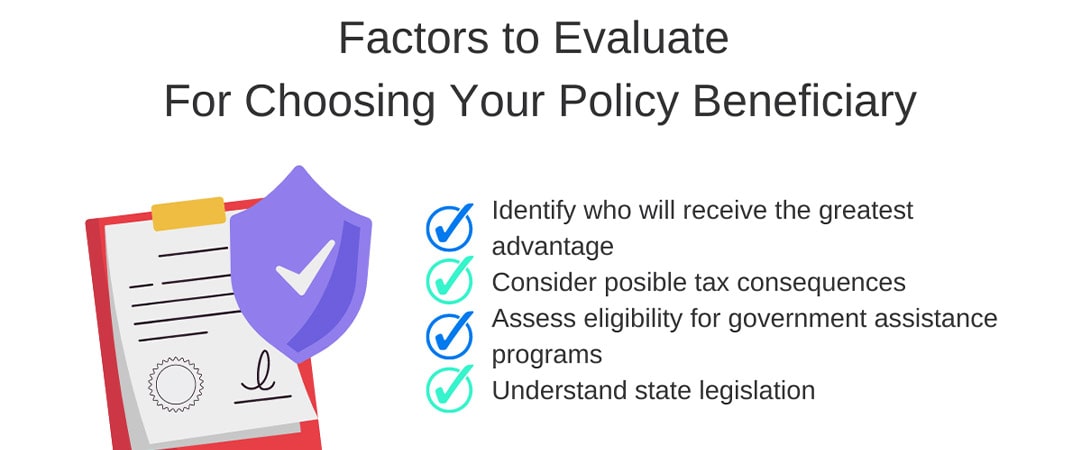“The goal of retirement is to live off your assets—not on them.” – Frank Eberhart
Selecting a beneficiary for your life insurance policy is a pivotal choice that should be approached with considerable thought. Your decision has the power to secure the financial stability of your loved ones. Brace yourself, and let’s delve into all you need to understand regarding designating a life insurance beneficiary, equipping you with an effective approach toward this critical component of financial planning. We tackle prevalent worries, draw attention to factors that might have escaped your notice, and aid in navigating around typical mistakes encountered in this process.
Take a few minutes and use our life insurance calculator to learn how much life insurance you really need, as well as calculate your retirement score today!
Key Takeaways
- When designing life insurance beneficiaries, selecting and correctly specifying primary and contingent beneficiaries is essential to ensure the intended distribution of death benefits and avoid legal complications.
- Choosing the right beneficiaries involves considering financial needs, tax implications, eligibility for government assistance, legal restrictions, and state laws, and can include family members, trusts, charities, and business partners.
- Regular review and updates to beneficiary information are crucial to reflect current intentions, especially after significant life changes, and understanding the distinction between revocable and irrevocable beneficiaries is critical for maintaining control over policy decisions.
Understanding Life Insurance Beneficiaries
Beneficiaries of a life insurance policy are the individuals or entities you choose to receive the death benefit when you pass away. These beneficiaries form an essential part of your insurance policy, as they ensure your financial protection is directed according to your wishes. If a beneficiary is not designated, it can result in considerable holdups and potential legal issues when disbursing these funds [1].
Grasping the different categories of beneficiaries and their functions within a life insurance plan is crucial. Get help from a financial advisor for determining the best beneficiaries for your life insurance policy.
Primary Beneficiary
The individual designated as the primary beneficiary will be the first to collect the death benefits from a life insurance policy [2]. Selecting this person requires thoughtful consideration, typically involving spouses or close family members who would bear significant financial repercussions in your absence. It is possible to appoint multiple primary beneficiaries and determine how much of the death benefit each should receive. Nevertheless, it’s vital to assess whether these recipients can appropriately handle their inherited funds – an important factor if they happen to be minors or lack financial savvy.
Ensuring that your chosen beneficiary has a legitimate insurable interest is key. That means they would encounter economic hardship due to your passing. This holds especially true for life partners or spouses dependent on the income provided by the insured party, whereupon receiving life insurance proceeds could offer crucial fiscal support and security during challenging times.
Contingent Beneficiary
The primary beneficiary is the initial recipient of the death benefit from a life insurance policy. Having contingent beneficiaries in place—referred to as secondary beneficiaries—is critical. These individuals stand next in line to inherit the life insurance proceeds should anything prevent the primary beneficiaries from doing so. Should the primary beneficiaries pass away before the policyholder or be otherwise incapable of receiving their benefits, these alternates ensure that the distribution of funds avoids legal entanglements such as probate and reaches those who were intended by whoever held the policy.
Creating this provision prevents unnecessary legal hurdles and expedites asset allocation when needed most. It gives clear instructions to an insurance company on how to proceed with disbursing death benefits if a primary beneficiary cannot accept them, thereby executing what has been set forth by the person purchasing said coverage.
Selecting the Right Beneficiary for Your Policy

Choosing the appropriate beneficiary for your life insurance policy is a vital choice that demands careful consideration. This decision typically involves evaluating several factors.
- Identifying who will receive the greatest financial advantage from the death benefit
- Considering possible tax consequences
- Assessing how it may affect eligibility for government assistance programs
- Understanding relevant state legislation

When contemplating appointing multiple beneficiaries to your life insurance, there are various typical options and important elements to bear in mind during selection.
Family Members
Typically, spouses or life partners are selected as the primary beneficiaries because they tend to rely financially on the individual holding the policy. This established insurable interest positions them as an obvious choice for this role. Nevertheless, in situations where there is no spouse or if a spouse does not require financial support, adult children may become primary beneficiaries. Other family members like siblings or parents might be considered eligible when they share a close relationship with the policyholder or bear some financial obligation.
Appointing a relative as a beneficiary is key to securing their monetary stability and conveys explicit instructions about how one wishes benefits to be allocated upon their passing. Prompt disbursement of funds can be essential in meeting end-of-life expenses and sustaining financial aid. Hence, appointing a clear beneficiary accelerates that process. It’s imperative, though, to evaluate whether your chosen family member has enough capability to handle receiving such amounts responsibly. Should doubts arise regarding their capacity for fund management, creating trust could serve as an effective alternative to properly overseeing those assets. You can also contact your trusted financial advisor, and if you don’t have one yet, you can ask us your questions at The Institute of Financial Wellness.
Trusts and Legal Guardians
Involving trusts and legal guardians in your life insurance planning can be particularly beneficial when minor children or those with special needs stand to inherit. Appointing a trust as the beneficiary gives you power over how the life insurance proceeds are distributed, including dictating specific amounts and deciding on distribution schedules. While establishing a trust may come with higher initial costs compared to direct beneficiary designations, it offers valuable advantages by safeguarding that the funds are utilized according to your wishes.
For minor beneficiaries, setting up a trust or naming an official guardian is essential for handling their inheritance of life insurance money until they become legally capable in adulthood. Similarly, using trusts designed for individuals with special needs can help maintain life insurance assets under careful administration while preserving their access to government aid programs. It’s also worth mentioning that once set up, modifying an irrevocable trust or changing beneficiaries typically necessitates obtaining written consent from them or pursuing judicial modifications—this adds a layer of assurance that only your chosen beneficiaries will receive the intended benefits from your policy [3].
Charitable Organizations and Business Partners
Non-profit entities and commercial allies may be designated as recipients for defined objectives within a life insurance policy. Non-profits can occupy the role of primary or backup beneficiaries, offering a significant channel to support cherished philanthropic initiatives [4].
Conversely, naming corporate associates as beneficiaries on insurance policies ensures adequate funds are available to purchase the interest of a partner who has passed away from their holdings, thus maintaining the stability of the business enterprise. Vital staff members might also be appointed as permanent beneficiaries in professional life insurance plans to reinforce strategies for preserving operational continuity.
Designating and Updating Beneficiaries

After selecting the individuals who will receive benefits, it’s essential to proceed with formally designating your beneficiaries in your policy. This requires you to furnish precise details about each beneficiary and fill out necessary documentation, which can be done digitally or by utilizing advisory services.
Equally important is maintaining current information on all designated beneficiaries. Particularly following major life events, updating this data is vital for preventing legal issues that could arise and guarantees prompt allocation of benefits.
Designation Process

When setting up a beneficiary designation for life insurance, it’s essential to include accurate details like:
- The full legal name of the beneficiary
- Their current address
- Date of birth
- Social Security number
- How they are related to the person holding the policy
This crucial data can be submitted through forms supplied by your life insurance company, online systems, or with the help of advisory services.
By maintaining precise and updated beneficiary designations, you facilitate immediate access to life insurance proceeds to cover final expenses while sidestepping an extended and possibly expensive probate process.
Updating Beneficiary Information
It’s important to remember that beneficiary designations within a life insurance policy should be actively maintained rather than left unattended. To ensure they continue to align with your wishes and current circumstances, it is advisable to routinely assess and revise these choices following key life changes such as getting married, having children, getting divorced, or experiencing the loss of an earlier beneficiary.
Neglecting to keep your life insurance beneficiary designations up-to-date can result in unintended outcomes. For example, if you do not make necessary adjustments post-divorce, there’s a risk that the proceeds from your insurance policy could still go to your former spouse inadvertently. Making updates regarding who should benefit from the policy is simple. Many financial institutions offer online modification capabilities or provide forms for submitting any changes required.
Consequently, adjusting information about who shall receive benefits after one’s passing—an action which might include removing an ex-spouse—is often easily executed either through digital platforms provided by insurers or via submission of paper documentation directly to the institution issuing the life insurance contract.
Tax Implications and Legal Considerations

Life insurance serves as a financial safeguard for your beneficiaries. It is important to be aware of the possible tax consequences and legal factors that may come into play. These aspects can differ based on the category of beneficiary designated and the specific regulations in place within each state.
Seeking expertise from a financial advisor is advisable for advice regarding investment accounts. Such guidance can help ensure informed decision-making regarding these matters, and The Institute of Financial Wellness can help.
Taxes on Death Benefits
Typically, beneficiaries of a life insurance policy receive the death benefit without owing taxes on it. Nevertheless, interest that accrues on top of the death benefit is potentially subject to taxation. When an estate receives life insurance proceeds as the beneficiary, those receiving an inheritance could incur estate taxes [5].
Designating a trust as the recipient of your life insurance can be instrumental in reducing estate tax liabilities. This strategy demands thoughtful preparation. Thus, grasping the possible tax consequences associated with your life insurance is essential, and consulting with a financial advisor or tax expert is highly recommended for tailored guidance; The Institute of Financial Wellness is your ally.
Community Property Laws and Restrictions
Laws regarding community property and limitations on beneficiary designation can influence your life insurance policy. In states with community property regulations, a surviving spouse might have rights to a share of the life insurance proceeds even if they aren’t listed as a beneficiary. Certain states require that the policyholder appoint their spouse as the primary beneficiary or secure their written agreement to designate another individual.
Depending on where you live or who underwrites your insurance policy, there may be constraints concerning eligible beneficiaries for your life insurance. Consequently, being informed about these specific laws and limitations is essential when selecting the beneficiaries for your policy.
Revocable vs. Irrevocable Beneficiaries
The category of a beneficiary under an insurance policy can fall into one of two types: revocable or irrevocable. With the former, as long as the policy owner is still alive, they retain the right to modify beneficiaries at will without needing consent from those currently designated. This flexibility allows individuals to adapt their beneficiary arrangements in response to changes in their personal circumstances. Conversely, once someone has been named an irrevocable beneficiary, they have secured a position that cannot be altered unless they agree to it—ensuring a fixed promise for these recipients.
In contexts where maintaining life insurance coverage may be mandated by law—for instance, post-divorce situations—the role of an irrevocable beneficiary becomes particularly crucial. While updating who is listed as a revocable beneficiary involves merely completing some paperwork, any modification involving an irrevocable recipient typically requires obtaining their agreement in writing or resorting to court proceedings if necessary.
Common Pitfalls and Mistakes to Avoid

When selecting a beneficiary for your life insurance, navigating certain pitfalls and common errors is important. These mistakes often involve having outdated or incomplete information on file, neglecting the importance of designating contingent beneficiaries as backups, employing unclear designations that can lead to ambiguity, and failing to take into account state laws or the financial circumstances of the chosen beneficiaries.
Incomplete or Outdated Information
It’s crucial to ensure that all information regarding beneficiaries is complete and current. In instances where a beneficiary has not been specified for a life insurance policy, the proceeds will be allocated to the estate of the holder of the policy, thereby becoming entangled in the probate procedure. This might result in prolonged wait times before benefits are disbursed to those who were meant to receive them.
Likewise, it’s important to revise beneficiary details following major events in one’s personal life. Otherwise, unexpected outcomes could arise. For example, if you have undergone a divorce and entered into a new marriage without modifying your life insurance policy beneficiary designations accordingly, there exists a possibility that your former spouse may continue as the recipient of any pay-outs from your insurance policy.
Overlooking Contingent Beneficiaries
One widespread oversight is failing to appoint contingent beneficiaries. The absence of a named contingent beneficiary can markedly disrupt the allocation of death benefits should the primary beneficiary pass away before the policyholder or be unable to receive the benefits. Without a designated secondary recipient, life insurance proceeds may revert to being distributed through the policyholder’s estate. This could postpone disbursements to heirs because funds might first have to address debts and taxes pertaining to the estate.
If no suitable beneficiary has been assigned, state laws might dictate how death benefits are dispensed, potentially embroiling family members in an extended and expensive legal process. Consequently, it’s imperative for individuals holding a life insurance policy to designate primary and contingent beneficiaries as part of their planning strategy for distributing insurance proceeds posthumously.
Unlocking Financial Confidence: Navigating Life Insurance and Beneficiary Designation with The Institute of Financial Wellness
The complexity of life insurance and the detailed process of designating beneficiaries can be daunting. The Institute of Financial Wellness (IFW) exists to demystify these processes. As an extensive multimedia platform dedicated to financial education, resources, and services, IFW offers clear, unbiased financial information that empowers individuals with confidence and knowledge for sound financial decisions.
Among our various offerings are:
- Guided pathways like the IFW Retirement Roadmap
- Methods for minimizing college expenses from personal funds
- Optimization tactics for your retirement accounts, such as 401(k)s
- Risk management approaches pertaining to life insurance as well as disability and long-term care coverage
With the assistance of IFW’s educational materials paired with professional guidance tailored to review individual situations comprehensively, you gain access to crucial insights and opportunities on how best you might enhance your fiscal health.
Full Summary
Designating the right beneficiaries for your life insurance policy is a significant step in ensuring the financial security of your loved ones in the event of your death. From understanding the roles of primary and contingent beneficiaries to the tax implications and legal considerations, it’s crucial to navigate these aspects carefully. Remember, regular updates to your beneficiary designations are key to reflecting your current intentions. Avoid common pitfalls and seek advice from professionals like those at The Institute of Financial Wellness to make informed decisions.
Frequently Asked Questions
Does the beneficiary get all the life insurance money?
Should any loans outstanding be applicable, the beneficiary is entitled to a one-time disbursement encompassing the full death benefit amount. Typically, this payment is made as a lump sum and represents the most prevalent form of payout.
What are the rules for beneficiaries of life insurance?
In order to obtain the death benefit from a life insurance policy, it’s necessary for each of the multiple beneficiaries to actively submit their own claim to the insurance provider. This step is essential since the disbursement of benefits doesn’t occur automatically upon the policyholder’s death. Each beneficiary must individually claim their respective share under the life insurance policy terms.
Who should be my life insurance beneficiary?
Select a beneficiary who would experience financial hardship due to your absence. The benefit can be divided amongst several beneficiaries, provided that the combined total of their percentages amounts to 100 percent.
Does life insurance go to the next of kin or beneficiary?
The named beneficiaries on a life insurance policy, not the closest relatives by blood or marriage, are entitled to receive the life insurance proceeds unless the policy specifies differently.
Maintaining current beneficiary designations is crucial for the proper distribution of your assets in alignment with your preferences.
Who are called beneficiaries?
Designated individuals or entities known as beneficiaries are entitled to receive proceeds from financial products, including the balance of assets in retirement or investment accounts and the death benefit that a life insurance policy provides.




